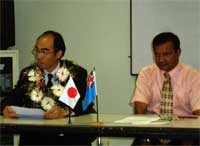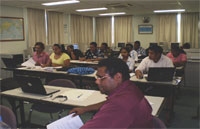Training Course on Climate Predictions and Applications, 16–20 Feb 2009


Simon McGree & Arieta Baleisolomone, Fiji Meteorological Service
The five-day training course was the second of three in a series of regional meteorological training courses funded by the Japanese International Cooperation Agency (JICA) and hosted by the Fiji Meteorological Service (FMS). The focus of courses in Phase One (2001-05) was entry to operational level meteorological observations taught according to the World Meteorological Organisation (WMO) standard curriculum. In Phase Two, FMS have been encouraged by JICA to organise higher-level courses on Climate Change and Disaster Mitigation. The first workshop held in 2007 was being a month long operational meteorology training program.
The theme of the February workshop was ‘Climate’ with the objectives resulting from discussions in 2008 on the future of the Island Climate Update. One central issue of discussion was the need for Meteorological Services in the South Pacific to be able to interpret global seasonal scale rainfall predictions and have greater ‘ownership’ of seasonal rainfall predictions presented in the Island Climate Update (ICU). The AusAID Bureau of Meteorology Pacific Islands Climate Prediction Project (PI-CPP) was also invited to this workshop to present the latest version of SCOPIC (Seasonal Climate Outlooks in Pacific Islands Countries), a statistical climate prediction model. The course organisers also considered it highly beneficial for the participants to have both the NZAid and AusAID Project Teams available at the same course. Nine Pacific Island nations participated, including the Cook Islands, Kiribati, Niue, Solomon Islands, Samoa, Tonga, Tuvalu, Vanuatu, and hosts Fiji.
NIWA representatives provided overviews of the multimodel approach to seasonal rainfall and sea surface temperature prediction used in the ICU. A new tool in the development stage called METPI (Multimodel Ensemble Tool for Pacific Islands) was shown, and training was delivered on how to it to provide increased participation by Pacific Island Meteorological services in the ICU process. Bureau of Meteorology representatives provided an overview of statistical based seasonal climate forecasting and tuition on the SCOPIC tool. This was followed by the Online Climate Outlook Forum (OCOF) 17 conducted at FMS and chaired by Mr. Lloyd Tahani of the Solomon Islands Meteorological Service.
The role of RSMC Nadi (Fiji) for Tropical Cyclones and the need for monthly and seasonal Tropical Cyclone Predictions was subsequently undertaken by FMS on Day Three of the workshop. Representatives from the Sugar Research Institute of Fiji and Fiji Electricity Authority participated in a discussion, and demonstrated how seasonal-scale climate predictions have benefited their industries. This discussion was followed by recommendations for PI-CPP and a presentation of certificates.
Overall, the course was very successful, with the first attempt at Pacific Island countries interpretation of global rainfall models included in this month’s ICU bulletin. In addition, there are plans to hold the ICU teleconference during the middle of each month in the near future, so there is greater time to gather essential data and utilise information from the PI-CPP OCOF teleconference in the ICU bulletin. Agencies interested in co-funding courses in Fiji are requested to contact the FMS.
